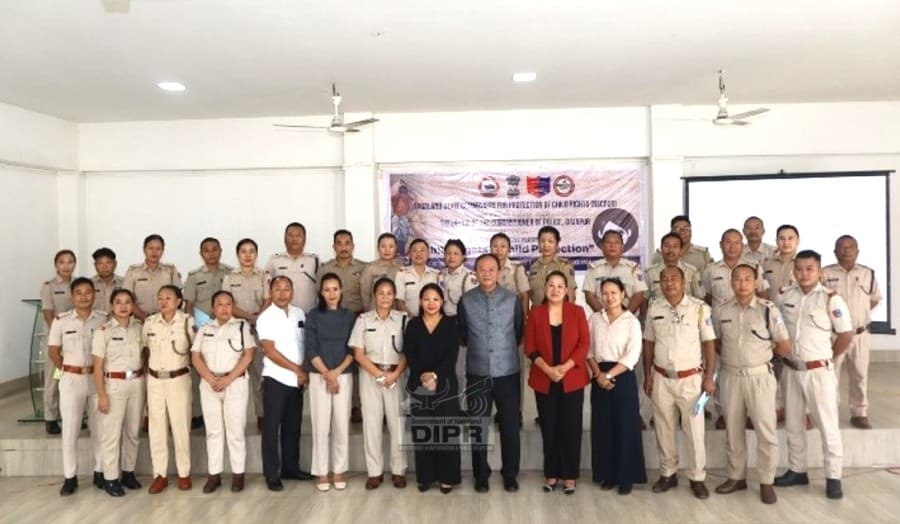Nagaland police officers attend awareness programme in Dimapur on child rights and protection laws organised by NSCPCR.
Share

DIMAPUR — The Nagaland State Commission for Protection of Child Rights (NSCPCR), in collaboration with the Office of the Commissioner of Police, Dimapur, organised a one-day awareness programme on “Child rights and child protection” at the conference hall of the Commissioner’s Office, Dimapur, on October 31.
In his keynote address, Chairman NSCPCR Alung Hangsingh stated that the three districts—Niuland, Chümoukedima, and Dimapur—are cosmopolitan areas where different cultures converge. With the advent of technology, things have become more complicated and challenging, particularly for police officers who handle child abuse cases and children in conflict with the law.
According to a DIPR report, he said that while police officers are well-versed with IPC and CrPC, when it comes to the Protection of Children from Sexual Offences (POCSO) Act or the Juvenile Justice (Care and Protection of Children) (JJ) Act, there are different approaches required, which may slightly differ from the usual way of dealing with criminals. Hangsingh noted that with the advancement of technology, information is disseminated very quickly, making it important to handle such cases with caution.
Reminding that children are the backbone of the nation, he questioned how far society has gone in making that a reality. He emphasised that the role of policing and police officers is vital, as their presence gives children a sense of security.
Stating that the Commission aims to reach every part of the state through such programmes, he informed that it began from the SP Office, Kohima, and this was the third meeting with police officers. He hoped that the interaction would help officers gain useful insights from the session.
Deputy Commissioner of Police (HQ) Ruth Murru, in her address, thanked the commission for organising the awareness programme. She stated that regardless of the number of legislation and statutory bodies, unless awareness and empowerment are promoted among stakeholders, those frameworks become ineffective. She therefore said that such awareness initiatives are crucial to making laws and statutory bodies functional and effective.
She pointed out that the programme was specifically targeted at the police community, as police are key stakeholders in ensuring justice and child protection. She expressed gratitude to the commission for selecting their department to educate, empower, and strengthen them in their role of delivering justice and ensuring child protection.
Murru urged the participants, police personnel, and officers to take the opportunity to empower themselves and clarify doubts regarding laws or challenges faced in the field while implementing them.
Legal Consultant, NSCPCR, Lichani Murry, speaking as a resource person, highlighted the objective of the JJ Act, stating that it creates a legal framework for the protection of the rights of all children—whether alleged or found to be in conflict with the law or in need of care and protection.
She stated that the legal foundation of child protection in India applies to children below 18 years of age.
She emphasised the role of children in conflict with the law; children in need of care and protection; child-friendly procedures; the role of the Special Juvenile Police Unit; the dos and don’ts of procedures at police stations; and maintaining records of conviction in safe custody until the expiry of the appeal period or seven years, after which they are to be destroyed by the Board or Children’s Court.
Member of NSCPCR, Akumla Longchari, who also served as a resource person, spoke on the topic “Understanding the POCSO Act: Role of police in ensuring timely justice”. She highlighted that the POCSO Act, enacted in 2012, is a gender-neutral law aimed at protecting children from sexual offences and pornography. The Act mandates child-friendly procedures in reporting, investigation, and trial to minimise trauma and avoid re-victimisation.
Longchari explained the six types of sexual offences under the Act—Penetrative Sexual Assault (Sec. 3); Sexual Assault (Sec. 7); Sexual Harassment (Sec. 11); Using a Child for Pornographic Purposes (Sec. 13); Aggravated Penetrative Sexual Assault (Sec. 5); and Aggravated Sexual Assault (Sec. 9).
She further elaborated on the role of police; child-friendly procedures; reporting; time-bound investigations; dos and don’ts under POCSO; and challenges and landmark judgements that have led to successful convictions.